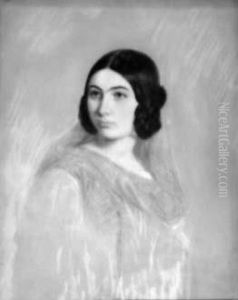Fanny Alaux Paintings
Fanny Alaux, born in 1810, was a French painter whose contributions to art, particularly within the genre of portraiture, have garnered attention for their sensitivity and skill, albeit her recognition has been more posthumous than contemporary. Her life and work are situated within a period of rich artistic evolution in France, where the Romantic movement was giving way to Realism, and later, Impressionism. Despite the challenges faced by women in the arts during the 19th century, Alaux managed to carve a niche for herself, primarily through her adeptness at capturing the essence of her subjects.
Her upbringing in a culturally vibrant environment likely fostered her early interest in painting, yet detailed records of her education and training are scant, a common issue when studying female artists of her time. It is known, however, that she was active in Paris, the epicenter of the art world in the 19th century, where she would have had exposure to the leading artists and movements of her day. While not widely documented, it is believed that she participated in the Paris Salon, an essential platform for artists aspiring to gain recognition.
Alaux's oeuvre primarily consists of portraits, notable for their detailed expressiveness and the ability to convey the personality of her sitters. Her style, while showing the influence of her contemporaries, also exhibits a unique sensitivity and a slight deviation from the strict realism that was becoming popular. Instead, her work hints at the emotional depth and individuality of her subjects, perhaps a reflection of her own experiences and challenges as a woman in a male-dominated field.
Despite her talents, Fanny Alaux did not achieve significant fame during her lifetime, and much of her work was only rediscovered and appreciated in later years. The scarcity of her paintings and the limited documentation of her life have made her a somewhat enigmatic figure in art history. Her death in 1880 marked the end of a career that, while not widely recognized at the time, has gradually come to be appreciated for its contribution to the portrait genre in French art.
Today, Fanny Alaux's legacy is that of a pioneering woman artist who managed to make her mark in the competitive world of 19th-century French art. Her works, when they surface, are celebrated for their emotional depth and technical proficiency, serving as a testament to her skill and as a reminder of the many overlooked female artists of her era. Her story contributes to the broader narrative of women's struggle for recognition in the arts, highlighting the need for continued exploration and reevaluation of female artists' contributions to art history.
